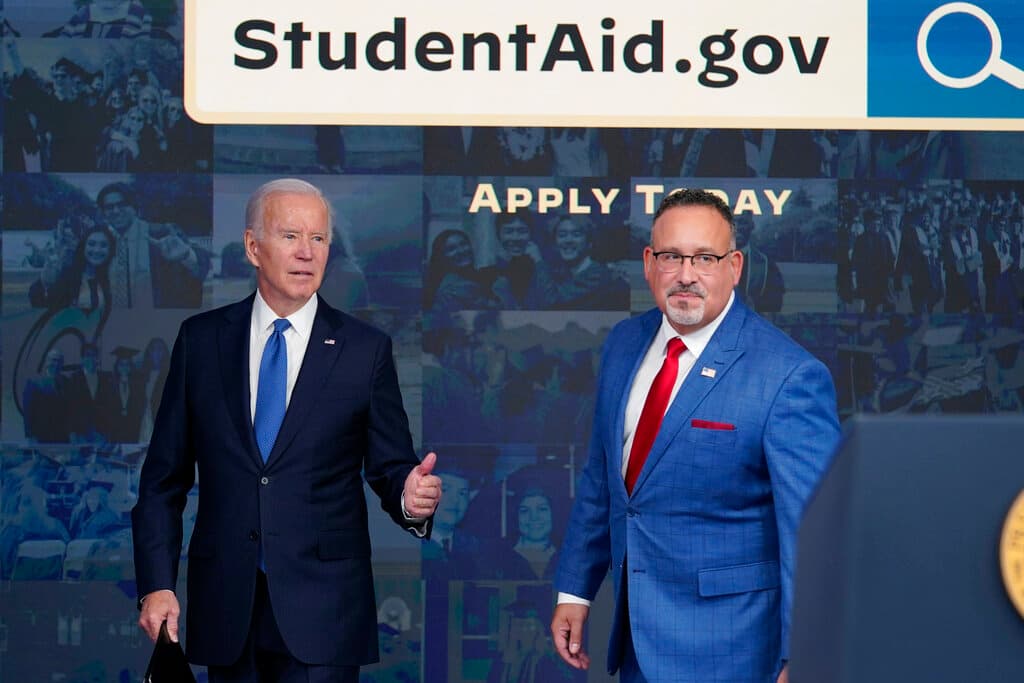Will Rule of Law Prevail on Student Debt?
Biden-Harris administration seems determined to erase student debt by hook or by crook.

Credit is due to the Supreme Court for trying to uphold the rule of law in the face of the Biden-Harris administration’s relentless pre-election effort to wipe out hundreds of billions in student loan debt. The Nine today refused to revive the latest loan amnesty scheme after an appeals court had blocked it. Meanwhile, President Biden’s defiance of the high court, which last year blocked his earlier amnesty, is fomenting a growing student debt strike.
The refusal to repay education loans has gotten so bad, one watchdog group finds, that “more than half of student-debt holders are not making payments.” That, the James G. Martin Center observes in a recent report, “is unsustainable.” The center chalks up the rising resistance to repayment to the Covid pandemic, during which there was a sanctioned pause on making student loan payments.
After that pause ended, though, the Martin Center reports, the Biden-Harris Education Department offered “a one-year transition period to allow borrowers time to ease back into the habit of paying their loans.” Meanwhile, Mr. Biden was pushing his plan to forgive, by executive fiat, some half a trillion in student loan debt. When the Supreme Court quashed that unconstitutional gambit, Mr. Biden refused to take “no” for an answer, high court be damned.
“The fight is not over,” the president averred. For students and recent college graduates who might be struggling to make ends meet, or on the fence about whether to make their loan payments, this message of defiance against the Supreme Court could well have tipped the scales against writing the check. The resulting student debt strike, these columns observed last August, was “one of the most dramatic affronts to the rule of law in years.”
Now, with the so-called transition period on the verge of expiring in September, the Martin Center notes, “tens of millions of borrowers have not yet made a payment.” This despite the fact that during the transition period borrowers were supposed to be making “financial arrangements to recommence payment,” even as the Biden-Harris Education Department vowed not to report delinquencies to credit agencies, put loans in default, or attempt to collect unpaid debts.
It all amounted to a kind of road-map for a de facto debt amnesty, even as the Supreme Court chided the president for breaching the separated powers and usurping a core function of the legislative branch — “its control of the purse,” as Chief Justice Roberts put it. In the court’s majority opinion, the Chief Justice observed that this has since the republic’s earliest days been a “check upon profusion and extravagance.”
Mr. Biden’s Democratic allies, meanwhile, cheered on his refusal to accept the ruling. Senator Schumer alleged “hypocrisy” by the justices, who “accept lavish, six-figure gifts” but forget “Americans saddled with student loan debt.” Senator Warren insisted Mr. Biden “has more tools to cancel student debt” and “must use them.” AOC impugned Justice Samuel Alito for taking gifts from a “billionaire who lobbied to cancel the student loan forgiveness.”
Sure enough, Mr. Biden, within months, came back with a new rationale for his debt forgiveness plans in a provocation to the high court. With some $1.75 trillion in student debt outstanding, mostly owed to Uncle Sam and guaranteed by taxpayers, the stakes are high. These columns have already noted the fundamental unfairness of asking taxpayers, even those who never went to college or already paid their debts, to subsidize college graduates’ defaults.
It is likely to prove a question at the polls on November 5. The Biden-Harris position seems to be that student debt will be erased, whether by hook or by crook. The amnesty, it appears, will take place with the sanction of regulatory fiat if possible. Barring the cooperation of federal judges and the Supreme Court, though, this loan “forgiveness” could end up being achieved by turning a blind eye to the refusal of borrowers to repay their duly contracted debts.

